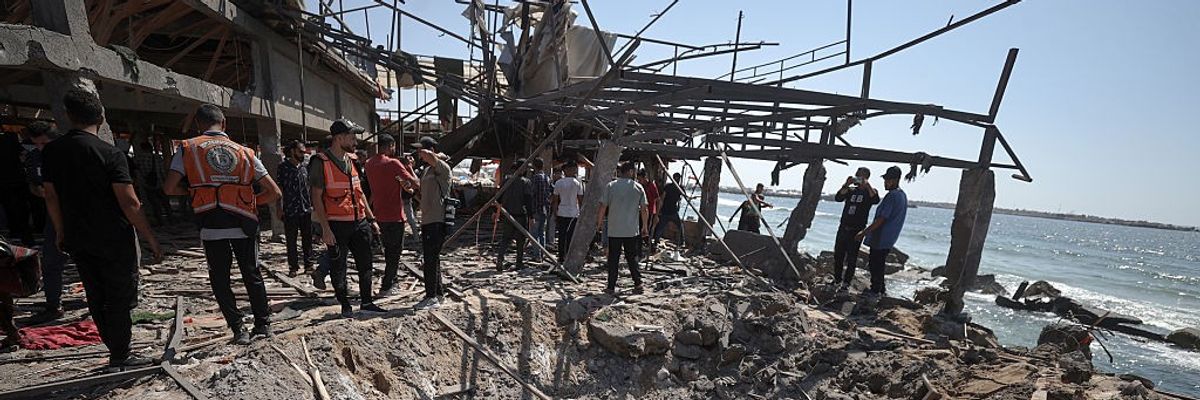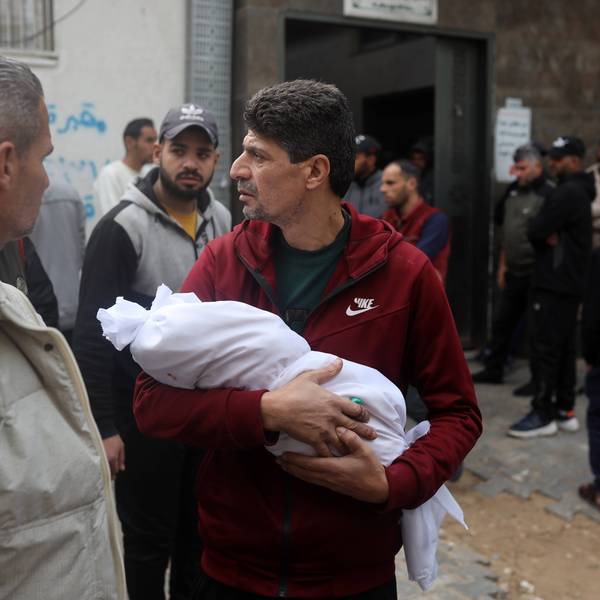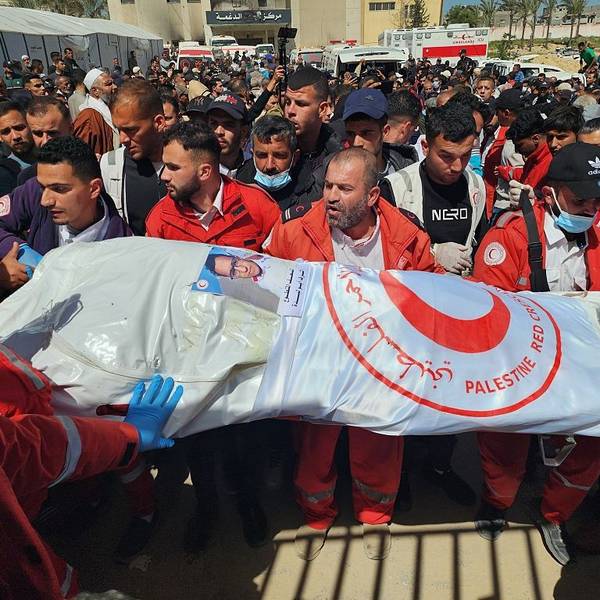
A view of the destruction after Israeli airstrikes hit a coffee shop in Gaza Strip on June 30, 2025.
Latest Israeli 'Massacre' in Gaza Used 500-lb US-Made Bombs: Report
The attack on a crowded café has been described by international law experts as wildly disproportionate, following new reporting about the munitions used.
International law experts are describing Israel's Monday attack on a Gaza café as a potential war crime after an investigation in The Guardian revealed that the attack was carried out using a 500-lb bomb supplied by the U.S. government.
Reporters photographed fragments of the bomb left behind in the wreckage of the al-Baqa Café. Weapons experts identified them as parts of an MK-82 general purpose bomb, which it called "a US-made staple of many bombing campaigns in recent decades."
The attack killed anywhere from 24 to 36 Palestinians and injured dozens more. Casualties included women, children, and the elderly. A prominent photojournalist and artist were also killed.
Experts have called the use of such a weapon on an area full of civilians wildly disproportionate and a likely violation of the Geneva Convention, which outlaws military operations that cause "incidental loss of civilian life" that is "excessive or disproportionate" to the military advantage to be gained.
"It is almost impossible to see how this use of that kind of munition can be justified," said Marc Schack, an associate professor of international law at the University of Copenhagen in comments to The Guardian. "If you are talking about 20, 30, 40 or more civilian casualties, usually that would have to be a target of very great importance."
After the attack drew heavy criticism, an army spokesperson for the Israel Defense Forces (IDF) said the strike had killed "several Hamas terrorists" and that "prior to the strike, steps were taken to mitigate the risk of harming civilians using aerial surveillance."
Gerry Simpson of Human Rights Watch criticized that defense.
"The Israeli military hasn't said exactly whom it was targeting, but it said it used aerial surveillance to minimize civilian casualties, which means it knew the café was teeming with customers at the time," Simpson told The Guardian. "The military would also have known that using a large guided air-dropped bomb would kill and maim many of the civilians there. The use of such a large weapon in an obviously crowded café risks that this was an unlawful disproportionate or indiscriminate attack and should be investigated as a war crime."
Since Monday's bombing, the attacks against civilians in Gaza have only intensified. According to a Thursday report from the Gaza Government Media Office, more than 300 Palestinians have been killed within the last 48 hours in "26 bloody massacres."
According to reporting Thursday from Al Jazeera, these have included attacks on "shelters and displacement centers overcrowded with tens of thousands of displaced people, public rest areas, Palestinian families inside their homes, popular markets and vital civilian facilities, and starving civilians searching for food."
At least 33 people were killed Thursday at a Gaza Humanitarian Fund (GHF) aid distribution site, adding to the hundreds of aid seekers who have been killed in recent weeks. In a Haaretz investigation last week, soldiers described these aid sites, administered by the U.S. and Israel, as a "killing field," where they have routinely been ordered to fire on unarmed civilians who posed no threat.
Two American contractors at a GHF site told The Associated Press on condition of anonymity that their colleagues fired their guns wildly, including in the direction of Palestinians. They provided a video which shows hundreds of aid-seekers crowded between metal gates, being assaulted with stun grenades and pepper spray, while gunshots echo in the background.
On Tuesday, Amnesty International and hundreds of other humanitarian NGOs called for an end to the Israeli government's blockade of food and other necessities entering the Gaza Strip. They also called for an end to the "deadly Israeli distribution scheme" and for a return of aid distribution to the United Nations and other international organizations.
"This devastating daily loss of life as desperate Palestinians try to collect aid is the consequence of their deliberate targeting by Israeli forces and the foreseeable consequence of irresponsible and lethal methods of distribution," said Agnès Callamard, the secretary general of Amnesty International, on Thursday.
An Urgent Message From Our Co-Founder
Dear Common Dreams reader, The U.S. is on a fast track to authoritarianism like nothing I've ever seen. Meanwhile, corporate news outlets are utterly capitulating to Trump, twisting their coverage to avoid drawing his ire while lining up to stuff cash in his pockets. That's why I believe that Common Dreams is doing the best and most consequential reporting that we've ever done. Our small but mighty team is a progressive reporting powerhouse, covering the news every day that the corporate media never will. Our mission has always been simple: To inform. To inspire. And to ignite change for the common good. Now here's the key piece that I want all our readers to understand: None of this would be possible without your financial support. That's not just some fundraising cliche. It's the absolute and literal truth. We don't accept corporate advertising and never will. We don't have a paywall because we don't think people should be blocked from critical news based on their ability to pay. Everything we do is funded by the donations of readers like you. Will you donate now to help power the nonprofit, independent reporting of Common Dreams? Thank you for being a vital member of our community. Together, we can keep independent journalism alive when it’s needed most. - Craig Brown, Co-founder |
International law experts are describing Israel's Monday attack on a Gaza café as a potential war crime after an investigation in The Guardian revealed that the attack was carried out using a 500-lb bomb supplied by the U.S. government.
Reporters photographed fragments of the bomb left behind in the wreckage of the al-Baqa Café. Weapons experts identified them as parts of an MK-82 general purpose bomb, which it called "a US-made staple of many bombing campaigns in recent decades."
The attack killed anywhere from 24 to 36 Palestinians and injured dozens more. Casualties included women, children, and the elderly. A prominent photojournalist and artist were also killed.
Experts have called the use of such a weapon on an area full of civilians wildly disproportionate and a likely violation of the Geneva Convention, which outlaws military operations that cause "incidental loss of civilian life" that is "excessive or disproportionate" to the military advantage to be gained.
"It is almost impossible to see how this use of that kind of munition can be justified," said Marc Schack, an associate professor of international law at the University of Copenhagen in comments to The Guardian. "If you are talking about 20, 30, 40 or more civilian casualties, usually that would have to be a target of very great importance."
After the attack drew heavy criticism, an army spokesperson for the Israel Defense Forces (IDF) said the strike had killed "several Hamas terrorists" and that "prior to the strike, steps were taken to mitigate the risk of harming civilians using aerial surveillance."
Gerry Simpson of Human Rights Watch criticized that defense.
"The Israeli military hasn't said exactly whom it was targeting, but it said it used aerial surveillance to minimize civilian casualties, which means it knew the café was teeming with customers at the time," Simpson told The Guardian. "The military would also have known that using a large guided air-dropped bomb would kill and maim many of the civilians there. The use of such a large weapon in an obviously crowded café risks that this was an unlawful disproportionate or indiscriminate attack and should be investigated as a war crime."
Since Monday's bombing, the attacks against civilians in Gaza have only intensified. According to a Thursday report from the Gaza Government Media Office, more than 300 Palestinians have been killed within the last 48 hours in "26 bloody massacres."
According to reporting Thursday from Al Jazeera, these have included attacks on "shelters and displacement centers overcrowded with tens of thousands of displaced people, public rest areas, Palestinian families inside their homes, popular markets and vital civilian facilities, and starving civilians searching for food."
At least 33 people were killed Thursday at a Gaza Humanitarian Fund (GHF) aid distribution site, adding to the hundreds of aid seekers who have been killed in recent weeks. In a Haaretz investigation last week, soldiers described these aid sites, administered by the U.S. and Israel, as a "killing field," where they have routinely been ordered to fire on unarmed civilians who posed no threat.
Two American contractors at a GHF site told The Associated Press on condition of anonymity that their colleagues fired their guns wildly, including in the direction of Palestinians. They provided a video which shows hundreds of aid-seekers crowded between metal gates, being assaulted with stun grenades and pepper spray, while gunshots echo in the background.
On Tuesday, Amnesty International and hundreds of other humanitarian NGOs called for an end to the Israeli government's blockade of food and other necessities entering the Gaza Strip. They also called for an end to the "deadly Israeli distribution scheme" and for a return of aid distribution to the United Nations and other international organizations.
"This devastating daily loss of life as desperate Palestinians try to collect aid is the consequence of their deliberate targeting by Israeli forces and the foreseeable consequence of irresponsible and lethal methods of distribution," said Agnès Callamard, the secretary general of Amnesty International, on Thursday.
International law experts are describing Israel's Monday attack on a Gaza café as a potential war crime after an investigation in The Guardian revealed that the attack was carried out using a 500-lb bomb supplied by the U.S. government.
Reporters photographed fragments of the bomb left behind in the wreckage of the al-Baqa Café. Weapons experts identified them as parts of an MK-82 general purpose bomb, which it called "a US-made staple of many bombing campaigns in recent decades."
The attack killed anywhere from 24 to 36 Palestinians and injured dozens more. Casualties included women, children, and the elderly. A prominent photojournalist and artist were also killed.
Experts have called the use of such a weapon on an area full of civilians wildly disproportionate and a likely violation of the Geneva Convention, which outlaws military operations that cause "incidental loss of civilian life" that is "excessive or disproportionate" to the military advantage to be gained.
"It is almost impossible to see how this use of that kind of munition can be justified," said Marc Schack, an associate professor of international law at the University of Copenhagen in comments to The Guardian. "If you are talking about 20, 30, 40 or more civilian casualties, usually that would have to be a target of very great importance."
After the attack drew heavy criticism, an army spokesperson for the Israel Defense Forces (IDF) said the strike had killed "several Hamas terrorists" and that "prior to the strike, steps were taken to mitigate the risk of harming civilians using aerial surveillance."
Gerry Simpson of Human Rights Watch criticized that defense.
"The Israeli military hasn't said exactly whom it was targeting, but it said it used aerial surveillance to minimize civilian casualties, which means it knew the café was teeming with customers at the time," Simpson told The Guardian. "The military would also have known that using a large guided air-dropped bomb would kill and maim many of the civilians there. The use of such a large weapon in an obviously crowded café risks that this was an unlawful disproportionate or indiscriminate attack and should be investigated as a war crime."
Since Monday's bombing, the attacks against civilians in Gaza have only intensified. According to a Thursday report from the Gaza Government Media Office, more than 300 Palestinians have been killed within the last 48 hours in "26 bloody massacres."
According to reporting Thursday from Al Jazeera, these have included attacks on "shelters and displacement centers overcrowded with tens of thousands of displaced people, public rest areas, Palestinian families inside their homes, popular markets and vital civilian facilities, and starving civilians searching for food."
At least 33 people were killed Thursday at a Gaza Humanitarian Fund (GHF) aid distribution site, adding to the hundreds of aid seekers who have been killed in recent weeks. In a Haaretz investigation last week, soldiers described these aid sites, administered by the U.S. and Israel, as a "killing field," where they have routinely been ordered to fire on unarmed civilians who posed no threat.
Two American contractors at a GHF site told The Associated Press on condition of anonymity that their colleagues fired their guns wildly, including in the direction of Palestinians. They provided a video which shows hundreds of aid-seekers crowded between metal gates, being assaulted with stun grenades and pepper spray, while gunshots echo in the background.
On Tuesday, Amnesty International and hundreds of other humanitarian NGOs called for an end to the Israeli government's blockade of food and other necessities entering the Gaza Strip. They also called for an end to the "deadly Israeli distribution scheme" and for a return of aid distribution to the United Nations and other international organizations.
"This devastating daily loss of life as desperate Palestinians try to collect aid is the consequence of their deliberate targeting by Israeli forces and the foreseeable consequence of irresponsible and lethal methods of distribution," said Agnès Callamard, the secretary general of Amnesty International, on Thursday.

